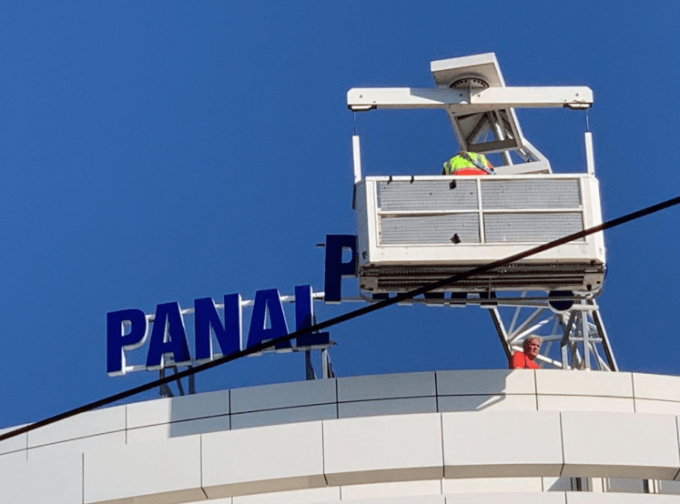2024: Sublime DSV, battered Kuehne, after a year to remember
It’s in the numbers – and mind the (Schenker) gap
FDX: ABOUT USPS PRIVATISATIONFDX: CCO VIEWFDX: LOWER GUIDANCE FDX: DISRUPTING AIR FREIGHTFDX: FOCUS ON KEY VERTICALFDX: LTL OUTLOOKGXO: NEW LOW LINE: NEW LOW FDX: INDUSTRIAL WOESFDX: HEALTH CHECKFDX: TRADING UPDATEWMT: GREEN WOESFDX: FREIGHT BREAK-UPFDX: WAITING FOR THE SPINHON: BREAK-UP ALLUREDSV: BREACHING SUPPORTVW: BOLT-ON DEALAMZN: TOP PICK
FDX: ABOUT USPS PRIVATISATIONFDX: CCO VIEWFDX: LOWER GUIDANCE FDX: DISRUPTING AIR FREIGHTFDX: FOCUS ON KEY VERTICALFDX: LTL OUTLOOKGXO: NEW LOW LINE: NEW LOW FDX: INDUSTRIAL WOESFDX: HEALTH CHECKFDX: TRADING UPDATEWMT: GREEN WOESFDX: FREIGHT BREAK-UPFDX: WAITING FOR THE SPINHON: BREAK-UP ALLUREDSV: BREACHING SUPPORTVW: BOLT-ON DEALAMZN: TOP PICK

The picture heading this article forever memorialises a sad day for Panalpina’s long-term staff, customers – and even us in the media.
And now it’s going to happen again, as the ‘pac-man’ that is DSV swallows up DB Schenker.
The world of logistics seems to be split into two about this – which is even true in the microcosm of The Loadstar office. There are those who think the DSV takeover of Schenker is an exciting new beginning, with rivals (and journalists) hoping for the inevitable fall-out for customers, DSV’s finances, and from watching the inevitably painful integration process.
But for others – and I include myself – there is sadness that a big name in freight will disappear forever.
Having been an avid watcher of the logistics business for some 20 years, you realise that each company has a very particular culture – in part, of course, derived from the people that work there, but also entrenched into the way it operates.
And DB Schenker is nothing if not unique. It’s always been a fighter; perhaps making up for its challenging position as an under-invested, yet relatively large, market player. It’s certainly done things other forwarders haven’t.
Remember in 2020, when Maersk swallowed Damco? DB Schenker immediately and publicly targeted Damco customers with a “stability package” – offering the same terms (in the short-term anyway) as Damco had, and prioritising quotes for Damco customers.
An even bigger example of its chutzpah was when it set up a subsidiary, DB Barnsdale, to collect all the revenue it thought it could get from claiming compensation from the air cargo cartel – it was hoping for some $3.3bn, including interest. Effectively, it started a new business stream, based not on its core business, but on the model of extracting cash from its suppliers.
As The Loadstar wrote at the time: “This, unsurprisingly, went down like a lead balloon with the carriers and their partners. It was accused of destroying long-standing relationships for (quite) a few bucks. Perhaps worse was the claim of hypocrisy. Because while the airlines were defending (or not) their part in fixing fuel surcharges, the forwarders too were under investigation for their role in ‘the Gardening Club’, arguably a far more considered version of price-fixing than the airlines’ attempts, as the secret ‘vegetable code’ suggested.”
However the market may have felt about that, Schenker certainly has been a big personality. And, in comparison with its new, dull, Danish overlords, whose earning calls alone are enough to turn a listener to stone, Schenker is a force of nature, culturally speaking. You may not condone it, but not many CEOs survive a drunken escapade in Singapore resulting in a fine and jail sentence. It certainly adds ‘colour’, as analysts say.
But this is also a CEO with heart: as reported by Loadstar Premium, at a recent internal meeting to which all staff were invited, a visibly emotional Jochen Thewes noted that “we are writing the final chapter of our company’s history”, according to sources. He admitted to feeling it was “his company, and you are my people”, and said it felt like “handing the keys to my home to someone else”.
And he asked staff to help DBS become one of the “greatest logistics powerhouses”, noting that while it would not be the Schenker of today, it would still be impressive and special.
Some Schenker staff, particularly in Germany, are said to be saddened. Edna Ayme-Yahil, former head of marketing and communications at Panalpina, wrote on LinkedIn: “Yet again, parasitic DSV is about to devour yet another freight forwarder in its never-ending bid to satisfy its appetite and expand through acquisition, since it is incapable of doing so through organic growth and intelligent business practices.
“We’ve sadly seen this story too many times before (UTi, Panalpina, Agility) so we know how this tale is going to end — with unbelievable destruction of human capital in the name of obscure financial market mathematics which doesn’t add value to employees nor to customers. The only people who benefit are the DSV management team and shareholders.”
Which no doubt sums up how many people, particularly in Essen, are feeling.
Others, especially outside Germany, have shrugged it off. One Asia-based manager, already looking for a new job, told The Loadstar, “Yes, it’s good, DSV will become the world’s number-one company.”
Knowing that dull DSV will be the world number-one (by revenue) doesn’t make my heart sing. And I know that when that Schenker sign is removed from the Essen offices, I won’t be the only one mourning the loss of a distinctive corporate culture, whether you liked it or not.
As a gift to The Loadstar readers from Loadstar Premium, you can read how the DSV takeover favours DB Schenker for free, all this week.
Check out today’s News in Brief podcast on the fall-out from the US port strike
Comment on this article